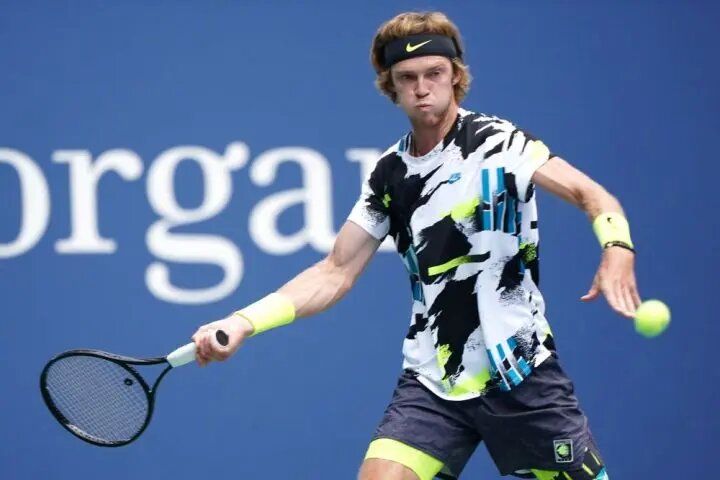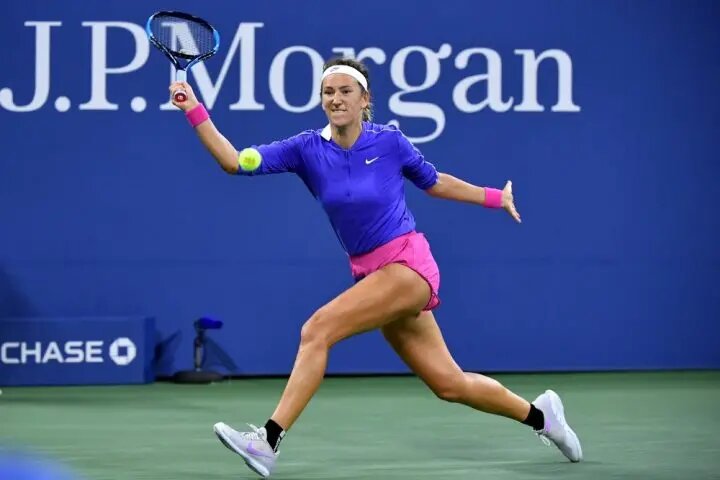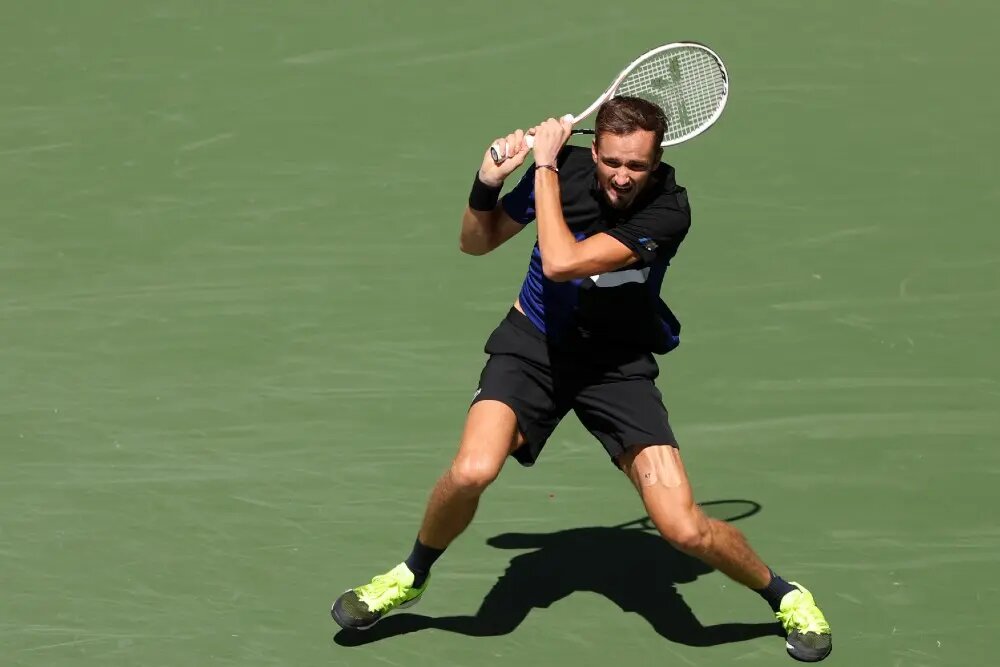It’s not necessarily the world’s best kept secret, but as time passes I realise more and more how florid the present of Russian tennis is and how it’s probably all downhill from here.
Daniil Medvedev will soon become a Slam champion, even if he does not win the 2020 US Open. The composure and effortlessness he oozes, serving lightning bolts while putting around 70% of his first serves in play (more often than not getting the free point); swirling a forehand whose backswing always looks far too wide (it reminds me a little of Steffi Graf’s) but is utterly unreadable due to that wrist whipping that hides his trajectories to perfection; placing the two-hander with metronomical precision both crosscourt and down the line – I could go on and on, but the point is, he is scary good.
Much has been written about Rublev, before and after his match against Berrettini. He is one of the most improved players on the ATP Tour, and is predicted to soon break into the Top 10 (I won’t be saying to this prophecy, even though I’m curious to see how he’ll fare at the French Open and more generally on clay). Unfortunately, neither he nor Medvedev will be in Rome – the latter’s withdrawal is already official, his is in the air.
Despite giving birth to champions like Kafelnikov and Safin in the past, Russia reached an unprecedented milestone on March 2, having three of her sons in the Top 15 at the same time, as Rublev joined Medvedev and Khachanov after back-to-back titles in Doha and Adelaide.
Yevgeny Kafelnikov, Sochi’s fresh prince, doesn’t appear to have a jealous bone in his body, quite the opposite: “I can tell you, kids at junior events in Russia don’t want to play like me or Marat, they want to play like Medvedev, Rublev, or Khachanov – it just makes sense. This is amazing for our country.”
A French youth coach, Cedric Raynaud, was interviewed by a colleague, Vincent Cognet, to talk about the junior careers of the two: “You could tell that Rublev would go places. He was very precocious. He could have played Futures events at 15. It took him three tournaments to become a Top 10 in the juniors. He was probably just over three stones [Editor’s Note: just to clarify, he’s exaggerating] but could hit rockets from all over the court. Medvedev was a late bloomer. He couldn’t handle the rally because he couldn’t hit hard on the run… He broke racquets, insulted his team. He verbally abused his father, who in his own turn was always very calm. He appeared to have so many technical limitations. For instance, he had no idea how to hit a volley. I would have never thought he would one day play a Slam final! And today, he’s one of the best players in the world… Both he and Rublev have the will and the skill to keep working on their game. They’re just enormous athletes.”
When the talent is there, hard work pays off… it might sound trite, but that’s the way it is.
Meanwhile, my stat guys tell me that this is the first time ever that two Russian players reach the second week in New York for two years in a row…
With this sort of background, it was clear that Medvedev vs Rublev was the match I anticipated the most, and the same goes for John McEnroe, who was watching from the stands, just like Sascha Zverev and
Dominic Thiem (although these two don’t really have much else to do inside the bubble).
I described it as a Grasshopper-and-Ant dichotomy, and it didn’t disappoint – actually, it was a pretty great match, with great quality on both sides. The problem is that the Grasshopper, Rublev, threw away the opening set: he was 5-1 up in the tie-breaker, then 6-3, only for the Ant, Medvedev, to get five consecutive points to steal it. Andrey got into self-abuse mode pretty quickly for his inability to put a first serve in play (one of them could have become a decisive ace) in a time of dire need – he threw his racquet on the ground (but didn’t smash it, since he dropped it flat) and then hit his duffel bag several times.

At some point during the second set, he yelled bullishly (real scary) but no curse words seemed to be involved. Keothavong, the umpire, called a verbal abuse violation anyway. Perhaps such a warning can be called even in the event of inarticulate screams, which can actually be unacceptable when loud or prolonged enough, although I would tend to be rather flexible in certain situations. Rublev complained at the changeover, but to no avail.
The younger Russian could not get over the loss of the first set, at least not as quickly as needed – it’s one of the reasons why he lost the second as well. In the third, Medvedev seemed a little uncomfortable for the first time in two weeks, but only towards the end.
Last night’s Russian derby might have been the 100th between the two, even as professionals, but the ATP only recorded two matches in official tournaments, both straight-set Medvedev wins. They are close friends and grew up playing against each other since they were about 10. However, they have always been very different.
Medvedev said: “We must have been 11 or 12 when we played each other in a match between our clubs. We must have been the worst-behaved players in the world. We shouted and cried all the time, we smashed our racquets… we even threw them in the stands! We hated losing. Andrey hit very hard even then, although not as hard as he does now… while all I could do was lobbing and junkballing. They were crazy matches.”
Medvedev also recalled a night out at Times Square when they were teenagers involving the two of them and Jelena Ostapenko. Rublev remembered that they ended up in Central Park because many places at Times Square were already closed (it must have been pretty late), and also that it wasn’t a very good idea, because some other kids started following them and hiding behind the trees: “We ran back to our hotel!”
During the match, Medvedev was able to capitalise on Rublev’s folly at the end of the opening set – he hit a double fault that propelled his fellow countryman, who couldn’t have asked for more, back into the match – and ended up winning once more in straight sets, as he has done every time in New York so far (the only man to do it). However, he had a few physical issues (soreness in the shoulder followed by leg cramps) towards the and of the match.
Somehow, Medvedev managed to hide the latter and got some help from the physio, who treated his shoulder but also assisted him a little with the cramps, a type of ailment that cannot be treated during an MTO but rather be eased during a regular changeover for a maximum amount of two times. This is what big-match experience looks like, the kind that Jannik Sinner lacked against the third Russian, Karen Khachanov, in their first round encounter – lucky for him, the Italian seems to have shaken it off pretty rapidly and got off to a great start in Kitzbuhel, something that shouldn’t be taken for granted given how shocked he appeared in New York due to the injury.
Before the Russian derby, Serena Williams showed some stamina progress, chasing down some balls that would have eluded her a week ago. She seems to start slow every time, but she’s still getting the wins. For the third match in a row, she survived a decider, a truly remarkable feat as it would be reasonable to expect a 39-year-old who is a little heavier than she used to be (I wouldn’t say overweight because there were times when she was in much worse shape) to run out of fuel. What happened instead is that she won those sets for 6-2, 6-3, and again 6-2, respectively ousting Stephens, Sakkari, and Pironkova.
Her problems now are the growing tension of the approaching final, a final in which she would go for her 24th Slam title, but also the amazing form of the other mom still in play, Vika Azarenka. The Belarusian imparted a bona fide lesson to Elise Mertens, as the 6-1 6-0 score abundantly shows – if Serena watched the match, she must have felt the pressure mounting even more. In addition, this is the only time in the fortnight with no two-day rest between matches, and if Serena (and the rest of the country) were banking on a headstart of a few hours on Vika – I suspect that the scheduling wasn’t an accident, but rather dictated by a wish to give a little more rest to Serena, regardless of the opponent – well, the ease and celerity with which Azarenka won her match completely nullified that (hypothetical) competitive advantage.

Tennis is almost always unpredictable, and the women’s game even more than the men’s, but the Azarenka we saw yesterday shouldn’t lose against post-lockdown Serena. But… there is always a but, and that is the 18-4 head-to-head score in favour of the American, an element that always carries some weight. It is also true, however, that they have only met once in the last four years and a half (Serena won 7-5 6-4 in Indian Wells 18 months ago). Should their matches from 12 years ago factor in? Probably not.
The motherly rendezvous is unmissable content, even though it will take place after the first women’s semifinal (Brady vs Osaka), which is slated for midnight – that means that the second match probably won’t start before 2am. Will you make it? Will I make it?






